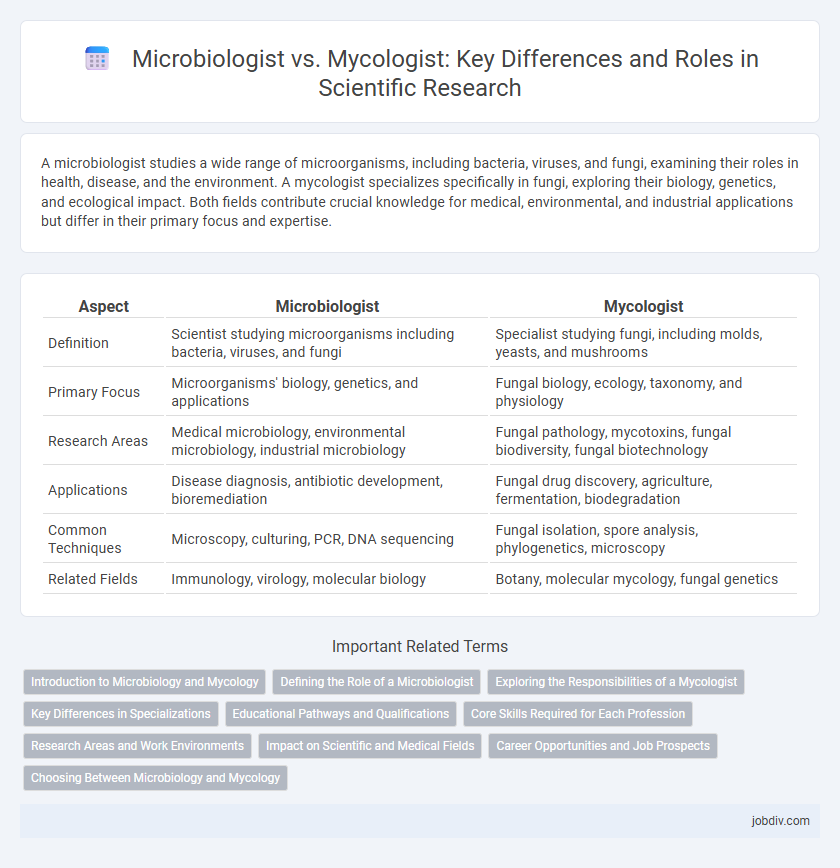A microbiologist studies a wide range of microorganisms, including bacteria, viruses, and fungi, examining their roles in health, disease, and the environment. A mycologist specializes specifically in fungi, exploring their biology, genetics, and ecological impact. Both fields contribute crucial knowledge for medical, environmental, and industrial applications but differ in their primary focus and expertise.
Table of Comparison
| Aspect | Microbiologist | Mycologist |
|---|---|---|
| Definition | Scientist studying microorganisms including bacteria, viruses, and fungi | Specialist studying fungi, including molds, yeasts, and mushrooms |
| Primary Focus | Microorganisms' biology, genetics, and applications | Fungal biology, ecology, taxonomy, and physiology |
| Research Areas | Medical microbiology, environmental microbiology, industrial microbiology | Fungal pathology, mycotoxins, fungal biodiversity, fungal biotechnology |
| Applications | Disease diagnosis, antibiotic development, bioremediation | Fungal drug discovery, agriculture, fermentation, biodegradation |
| Common Techniques | Microscopy, culturing, PCR, DNA sequencing | Fungal isolation, spore analysis, phylogenetics, microscopy |
| Related Fields | Immunology, virology, molecular biology | Botany, molecular mycology, fungal genetics |
Introduction to Microbiology and Mycology
Microbiology encompasses the study of microscopic organisms, including bacteria, viruses, archaea, fungi, and protozoa, focusing on their physiology, genetics, and ecology. Mycology is a specialized branch of microbiology dedicated to the study of fungi, including their taxonomy, pathogenicity, and roles in ecosystems and biotechnology. Both fields utilize advanced techniques such as microscopy, culturing, and molecular biology to understand microbial diversity and function.
Defining the Role of a Microbiologist
A microbiologist studies microorganisms including bacteria, viruses, fungi, and protozoa, investigating their genetics, physiology, and interactions with environments to address issues in health, agriculture, and industry. They utilize techniques such as culturing, molecular analysis, and microscopy to understand microbial behavior and develop applications like antibiotics and bioremediation. Unlike mycologists who specialize exclusively in fungi, microbiologists have a broader scope encompassing all microbial life forms.
Exploring the Responsibilities of a Mycologist
A mycologist specializes in the study of fungi, investigating their genetics, ecology, and potential applications in medicine and agriculture. Their responsibilities include isolating and identifying fungal species, analyzing fungal interactions within ecosystems, and developing antifungal treatments or biotechnological uses. Unlike microbiologists who broadly study microorganisms such as bacteria and viruses, mycologists concentrate exclusively on fungal life forms and their environmental and industrial impacts.
Key Differences in Specializations
Microbiologists specialize in the study of microscopic organisms such as bacteria, viruses, and protozoa, while mycologists focus exclusively on fungi, including molds, yeasts, and mushrooms. Microbiologists investigate broader microbial interactions and their roles in disease, ecology, and biotechnology, whereas mycologists emphasize fungal genetics, physiology, and their applications in medicine, agriculture, and industry. The distinction in specialization impacts methodologies, research objectives, and practical applications within the biological sciences.
Educational Pathways and Qualifications
Microbiologists typically pursue degrees in microbiology, biology, or related fields, often obtaining a bachelor's degree followed by a master's or PhD for advanced research roles. Mycologists specialize further by focusing on fungi within these programs or through dedicated mycology courses, frequently engaging in specialized research projects during graduate studies. Both professions require strong foundations in biology and laboratory skills, but mycologists develop expertise in fungal biology, taxonomy, and ecology, which are critical for careers in agriculture, medicine, and environmental science.
Core Skills Required for Each Profession
Microbiologists require expertise in cellular biology, biochemistry, and genetics to analyze microorganisms such as bacteria, viruses, and protozoa, emphasizing skills in laboratory techniques, microscopy, and molecular biology. Mycologists specialize in the study of fungi, demanding knowledge of fungal taxonomy, physiology, and ecology, alongside skills in culturing fungi, microscopy specific to fungal structures, and biochemical assays related to fungal metabolites. Both professions rely heavily on analytical thinking, experimental design, and data interpretation, but mycologists focus more on fungal-specific methodologies, whereas microbiologists cover a broader range of microorganisms and techniques.
Research Areas and Work Environments
Microbiologists study a wide range of microorganisms including bacteria, viruses, and fungi, focusing on their genetics, physiology, and interactions in diverse environments such as soil, water, and human hosts. Mycologists specialize specifically in fungi, investigating fungal biology, taxonomy, ecology, and their applications in medicine, agriculture, and biotechnology. Work environments for microbiologists range from clinical laboratories and pharmaceutical companies to environmental agencies, while mycologists primarily operate in research institutions, agricultural extensions, and fungal culture collections.
Impact on Scientific and Medical Fields
Microbiologists study a broad range of microorganisms, including bacteria, viruses, fungi, and protozoa, playing a critical role in understanding infectious diseases, vaccine development, and antibiotic resistance. Mycologists specialize in fungi, contributing essential knowledge to medical mycology, biotechnology, and environmental science by exploring fungal pathogens, antibiotics like penicillin, and fungal biodegradation processes. Both fields significantly advance scientific knowledge and medical treatments, with microbiologists offering a comprehensive microbial perspective and mycologists providing in-depth insights into the unique biology and applications of fungi.
Career Opportunities and Job Prospects
Microbiologists have diverse career opportunities in healthcare, pharmaceuticals, environmental science, and biotechnology, focusing on bacteria, viruses, and other microorganisms. Mycologists specialize in fungi, with job prospects in agriculture, medicine, food industry, and ecological research, addressing fungal diseases and biotechnological applications. Both fields offer growing demand due to advancements in microbial research and increasing awareness of microbial roles in health and environment.
Choosing Between Microbiology and Mycology
Choosing between microbiology and mycology depends on your interest in studying microorganisms in general or specifically fungi. Microbiology covers bacteria, viruses, archaea, and protozoa, offering a broad approach to microbial life, while mycology focuses exclusively on fungi, including their genetics, ecology, and medical implications. Career paths in microbiology often involve healthcare, biotechnology, and environmental science, whereas mycology careers may specialize in agriculture, pharmaceuticals, and fungal disease research.
Microbiologist vs Mycologist Infographic

 jobdiv.com
jobdiv.com